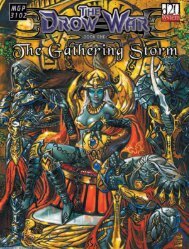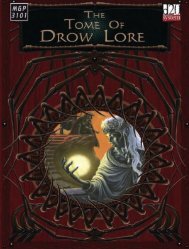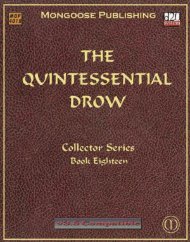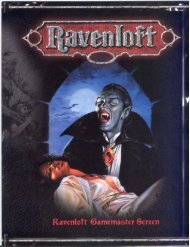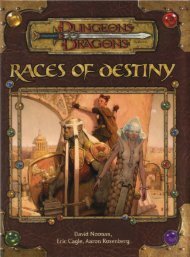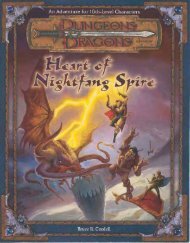Drow Magic. Sorcery Of Endless Night.pdf - RoseRed
Drow Magic. Sorcery Of Endless Night.pdf - RoseRed
Drow Magic. Sorcery Of Endless Night.pdf - RoseRed
Create successful ePaper yourself
Turn your PDF publications into a flip-book with our unique Google optimized e-Paper software.
individual spellcasters, they contain no guidelines or<br />
rules for creating magical effects which either require<br />
multiple participants or which are not dependant on the<br />
expenditure of spell slots.<br />
The rules presented here are expressly not needed for<br />
making or conducting those ceremonies which do not<br />
produce any sort of magical effect. Should the Games<br />
Master wish to present a scene which involves the<br />
performance of a ceremony which is important only for<br />
its traditional or symbolic value, such as a tea ceremony<br />
(though there is no reason that cannot be used as the<br />
basis of a magical ceremony, see below), then a series<br />
of checks against the appropriate skill will be more<br />
than sufficient to adjudicate the results.<br />
Creating a Ceremony<br />
While a number of drow specific ceremonies (known<br />
as black ceremonies) are presented here, invariably you<br />
will at some point wish to create your own ceremonies.<br />
With that in mind, we present the following guidelines.<br />
Note that these are not, for the most part, hard and<br />
fast rules – by necessity, ceremonial magic must be<br />
left open ended, as it will be used primarily to create<br />
magical effects which cannot be easily replicated with<br />
normal spells.<br />
The Limits of Knowledge<br />
Always keep in mind that the key conceit behind<br />
the rules for ceremony magic is the idea that it is<br />
neither wholly divine nor wholly arcane in nature,<br />
meaning it can be used by divine spellcasters and<br />
arcane spellcasters alike and, more importantly, by<br />
those who have no ability to use magic at all. To<br />
create a ceremony which specifically requires the use<br />
of arcane or divine magic in its conducting is to do<br />
nothing more than create an unwieldy spell and thus,<br />
to miss the point of ceremonial magic altogether.<br />
<strong>Magic</strong> ceremonies are typically very complex and<br />
only the most learned and wise ever learn to master<br />
more than a handful of ceremonies. No mortal<br />
character may ever know more than one magical<br />
ceremony per point of his Intelligence and Wisdom<br />
modifiers combined.<br />
With the Games Master’s permission, a character<br />
who has reached his maximum number of<br />
ceremonies known but wishes to learn another can<br />
do so, so long as he is willing to purge his mind of<br />
one of his previous known ceremonies.<br />
47<br />
BLACK CEREMONIES<br />
Creating a ceremony is not like crafting a magical item<br />
and the rules presented here are not intended to mimic<br />
exactly the steps the characters in your campaign will<br />
take. At no point, for example, will a wizard use his<br />
abacus to calculate skill check DCs, nor will your<br />
player’s clerics write in their journals ‘Today I presided<br />
over a ritual which required moderate materials,<br />
extensive effort, and included the restriction: season<br />
specific’. These guidelines are nothing more than a<br />
framework which will, hopefully, serve as invisible<br />
support for your adventures.<br />
In order to better facilitate the integration of ceremonial<br />
magic into your campaigns and to make it simpler<br />
for players and Games Masters alike to create new<br />
ceremonies, ceremonies are presented in a format<br />
similar to that used to present spells in Core Rulebook<br />
I.<br />
Effects<br />
The single most important step in creating a new<br />
magical ceremony is creating its effect. Without an<br />
effect, without a goal to work towards, a ceremony<br />
is nothing but a song and dance number. The effects<br />
which can be produced through the use of a magical<br />
ceremony are effectively limitless, but there are certain<br />
things you should always keep in mind when deciding<br />
what your ceremony will do.<br />
First of all, a ceremony should produce an effect which<br />
is not easily replicated through the casting of a spell.<br />
This means that ceremony magic should primarily be<br />
used to create abstract effects, or to bring about effects<br />
which are simply too powerful or specialised for even<br />
the most powerful of spells, miracle and wish. Note<br />
that this is not a hard and fast rule – several of the<br />
sample black ceremonies presented later can at least<br />
in part be replicated through the casting of several<br />
divine or, especially, arcane spells, though in each<br />
case they are altered in one or more fundamental ways.<br />
Rather, this is just a guideline to help you keep those<br />
ceremonies you create more interesting. If you do<br />
intend to create a ceremony which might be replicated<br />
by a spell, however, you should at least make sure it is<br />
made more interesting and abstract by the addition of<br />
unique elements – there should be no such thing as a<br />
magic missile ceremony unless, for example, the bolts<br />
can be fired across the span of the globe and are really<br />
the coagulated essence of the spirits of those murdered<br />
unjustly by the target.<br />
The second thing to keep in mind, and this is perhaps<br />
just as important as the above consideration, you<br />
should never limit yourself to effects which have





